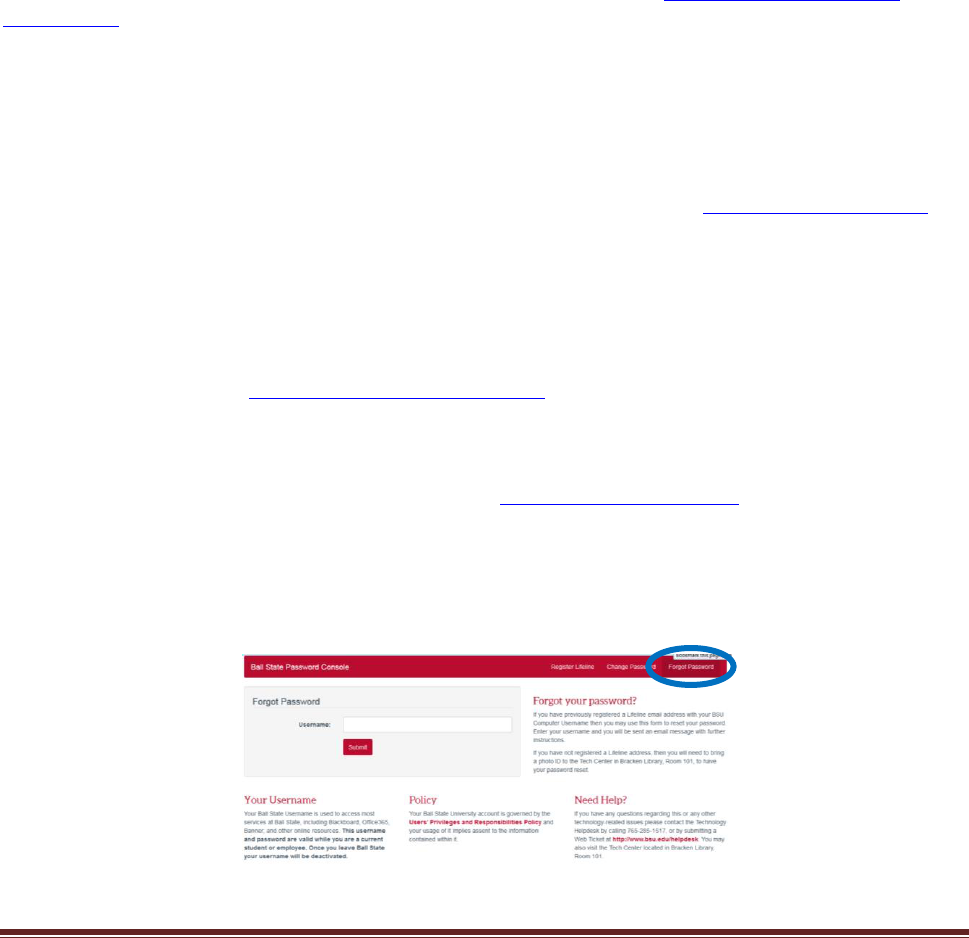
Dual Credit Program
Student and Parent Handbook
Division of Online and Strategic Learning
David Letterman Communication and Media Building, Room 131
N. McKinley Avenue
Muncie, IN 47306
765-285-1581 or 1-800-872-0369
August 2018

DCP Student and Parent Handbook 9/10/2018
Page 2
Dear Student and Parents,
Preparing early for your college experience becomes ever more critical these days. Ball State
University’s Dual Credit Program, a term used for dual credit classes, provides you this opportunity
by offering college curriculum courses for credit while you are still attending high school.
The Dual Credit Program’s mission is to foster a partnership between Ball State University and your
high school. We focus on your college preparation by assuring quality instruction and offering you
an experience otherwise unattainable before entering college. Qualified teachers from your school,
who have been certified by Ball State University academic departments, teach the on-site courses,
while the online courses are taught by the Ball State University’s instructors. Teachers use course
materials that are consistent with those found at the university and conduct the courses with the
same standards demanded of on-campus courses.
Course credits earned through the dual credit helps you establish a college academic record and
the credits you earn also apply toward your high school graduation requirements.
Textbooks will need to be purchased for the online classes.
We appreciate your interest in Ball State University’s Dual Credit Program. Your decision to
investigate this opportunity will prove to be an important step in preparing for success in your
future academic endeavors.
If you have any questions, please feel free to contact my office at 1-800-872-0369.
Sincerely,
James C. Hendrix, Ph.D.
Director

DCP Student and Parent Handbook 9/10/2018
Page 3
Table of Contents
Admissions & Codes of Conduct ............................................................................................................. 5
High School Dual Credit Admission Guidelines .................................................................................. 5
Ball State Admission/Registration Process ........................................................................................ 6
Code of Student Rights and Responsibilities ...................................................................................... 8
Course Selection and Offerings ............................................................................................................... 9
Cost of Courses .................................................................................................................................... 9
Evaluations .......................................................................................................................................... 11
Payment Information .............................................................................................................................. 12
Payment Methods ............................................................................................................................... 12
Dropping or Withdrawing .................................................................................................................... 13
Financial Aid ........................................................................................................................................ 14
Transcripts and Transfers ...................................................................................................................... 15
Course Transferability ........................................................................................................................ 15
Connect with Us ...................................................................................................................................... 17

DCP Student and Parent Handbook 9/10/2018
Page 4
Benefits of Ball State Dual Credit
We at Ball State would like to thank you for your interest in our Dual Credit program. There are
multiple benefits for students who participate:
Demonstrates to college boards that you are able to successfully complete college-level
work
Eases a transition from high school to college
Allows you to begin your freshmen year with college credits
Opens doors to explore various majors
Reduces tuition costs, as dual credit courses are offered at significantly lower rates
If you would like to learn more about dual credit, please visit https://www.accreditedschoolsonline.org
for general information and http://ecs.force.com for Indiana specific information surrounding dual
credit. If you decide that you are interested in participating or want to learn more about the Ball State
Dual Credit program, the following is a guide to answer any questions you may have.

DCP Student and Parent Handbook 9/10/2018
Page 5
Admissions & Codes of Conduct
When signing up for Dual Credit through your high school, the registration and admission process
is twofold. The first is being admitted through the high school. The second includes being
admitted through Ball State itself.
High School Dual Credit Admission Guidelines
Any juniors or seniors with a strong academic background and desire to attend college make good
candidates for the Dual Credit program. The primary goal of the Dual Credit program is to help
prepare you to attend college by providing you with opportunities to earn college credit and gain
experience.
The high school principal or guidance counselor identifies and approves students who are eligible
for college preparation courses based on the following guidelines:
On track to fulfill the basic academic preparation for admission to a four-year College or
University;
Rank in the upper third of the high school class;
Have a grade point average (GPA) of 3.0 or higher on a 4-point scale (as evident by a
college preparatory curriculum and advanced coursework);
Principal, teacher or counselor recommendation
Please consult with your guidance counselor about taking dual credit courses. You cannot exceed
15 semester hours of concurrent enrollment courses unless an exception is established by the
Division of Online and Strategic Learning at Ball State University.
Required Forms for Dual Credit
When applying for a Dual Credit course, two forms are required:
1. Student Verification Form and FERPA (Digital) : The Student Verification Form is used to
create, update, or reactivate your record. In addition, in compliance with the Federal Family
Educational Rights and Privacy Act (FERPA) of 1974, the university is prohibited from
providing certain information to a third party. You hold the rights for the course(s) you are
registered in, and we may not release any record information to anyone without your
permission. Please click the link above to continue to fill this form out.
2. High School/Parent Permission Form (Physical) : The High School Parent/Guardian
Permission Form requires signatures from the following: the student requesting the
class(es), the parent acknowledging the financial obligation and the school approving the
student’s eligibility and having met the prerequisites.
Note: Admission into the Dual Credit Program does not guarantee admission to Ball State University as an on-
campus student; on-campus admission is an entirely separate process. By taking dual credit courses, you will
have a permanent record at Ball State University.

DCP Student and Parent Handbook 9/10/2018
Page 6
Ball State Admission/Registration Process
To enroll in Ball State University’s dual credit courses you must be admitted to the university. There
are different registration/admission processes depending on your status.
When any of the following documents are submitted to Ball State, a temporary record is created:
Transcript or test scores
Pending admission or admitted to Ball State
Have a common name
Attended a previous term and have a username and password already
Returning Students: Any student with a Ball State username and password is considered a
returning student, even if they have not taken a class. If your Student Verification Form has been
processed, your present Ball State username and password will become active and you may
register for your classes using the Returning Student instructions.
New Student: If you are completely new to Ball State and have not requested any documents be
submitted to Ball State, you can register and get admitted using the New Dual Credit student
instructions. You will select your courses first and then create your record. In about five days, you
will receive your Ball State username and password.
Ball State Email Account
Once you are admitted to Ball State and have received your Ball State username and password, you
will have access to your Ball State email account which can be found at www.bsu.edu/webmail.
Click on “Log in to Ball State webmail” and sign in with your Ball State username and password. All
communication with your instructor will be through your Ball State email account. Your personal
email account can be used as a backup email account in case you forget your username or
password.
Communication Center: As a BSU student, you will be sent on-campus information. To manage
your subscriptions, go to www.bsu.edu/communication and click on “Communication Center”.
From there, continue to “Manage My Subscription”. Unmark any areas from which you do not wish
to receive any information.
Resetting Password: To reset your password, go to www.bsu.edu/password. Click on “Forgot
Password” in the top right hand corner. You will need to know your Ball State username to
continue. Your information will be sent to your personal email address listed on your student
records. You will receive two emails from “No Re[email protected]”. The first email will contain a URL
as well as a key code. To continue, select the URL and enter the key code on the page. Afterwards,
you will receive a second email with your Ball State username and password.

DCP Student and Parent Handbook 9/10/2018
Page 7
If you have problems regarding your username and password, please contact your Guidance
Counselor and they can contact the Ball State Helpdesk (1-866-771-3276 or 1-765-285-1517) for
further assistance. Once you have your username and password, you will be able to change your
username, password, or your email address at www.bsu.edu/password.
Ball State University Identification Card
Ball State University’s official identification card is available to all Ball State students. Everyone
receives their first BSU ID at no charge. If lost or damaged, a replacement card is available for a fee.
The card will be issued after you have registered for classes and will be sent to your school’s point of
contact, counselor or instructor. If you need to replace your ID card, please contact the Registrar's
Office. This fee will be placed on your Ball State Bursar’s bill.
Ball State University’s ID Number
A Ball State username and password is required to be able to view your Ball State University
identification number. It can be viewed by signing into https://my.bsu.edu. After this, follow the
button that reads “Self-Service (SSB)” then “Personal Information”. This is a unique identification
number generated for your privacy protection.
Ball State University Grade Information
The university reports and records grades using the plus/minus letter system. Quality points are
allocated to each recorded grade according to the following scale:
A = 4.0
A- = 3.667
B+ = 3.333
B = 3.000
B- = 2.667
C+ = 2.333
C = 2.000
C- = 1.667
D+ = 1.333
D = 1.000
D- = 0.667
F = 0
Credit earned under the Dual Credit Program will be recorded as if the course were taken on the Ball
State campus; therefore, it will be applicable toward a degree at Ball State University.
Keep track of your college credit grades. If you are unable to maintain a C or above, talk with your
parents, counselor, and instructor. If needed, request to withdraw from the course by emailing
dualcredit@bsu.edu. Grades could impact any main campus admission verification status.
High school official grades are posted when the classes are completed. A high school year-long
class grade is posted with an “I” for incomplete at the end of the BSU fall term. A Change of Grade
form is processed posting the final grade at the end of your school year. Grades are available for
viewing five days after the Ball State term end date at https://my.bsu.edu. Sign-in with your Ball
State username and password. Click on the “Self Service (SSB)” link. Afterwards, click on the
“Student” and “Student Records” links. Finally, click the “View Final Grades” button.
Ball State University Scholastic Standards
Please be aware of the following Ball State University scholastic standards:
Academic Probation occurs when your university’s cumulative grade point average is below
2.000
Dismissed from the University occurs when you fail to earn a cumulative grade point
average of at
least a 1.000 during the first semester of attendance.

DCP Student and Parent Handbook 9/10/2018
Page 8
It is your responsibility to adhere to the university scholastic standards and seek assistance if
needed. The scholastic policies are intended to encourage satisfactory progress toward meeting
the minimum requirements for entering college.
View Grades
Students can view their grades online at https://my.bsu.edu. In order to view them, the students
must sign in with their BSU username and password. Afterwards, they must click on “Self-Service
Banner,” “Student,” “Student Record,” and finally “View Final Grades.” Grades will available five days
after Ball State’s term end date.
Code of Student Rights and Responsibilities
The Ball State Code of Student Rights and Responsibilities is published online at
http://www.bsu.edu/studentcode. “The code provides extensive information about the rights of
students as members of the Ball State community as well as expectations for their behavior and
the procedures used to address behavior that falls short of expectations”. The code applies to
students while they are on or off campus, when they attend university-sponsored events, or when
such conduct involves the security or integrity of the university community. The Code of Students
Rights and Responsibilities is provided by the Office of Student Rights and Community Standards
http://www.bsu.edu/studentrights.
Academic Dishonesty
Actions which include, but are not limited to, cheating, plagiarism, falsely claiming to have
completed work, cooperating with another person in academic dishonesty, knowingly destroying or
altering another student's work, or attempting to commit an act of academic dishonesty that
violates the Student Academic Ethics Policy, Section VII. Academic Dishonesty may result in an
informal meeting, removal from the dual credit course, dismissal from the university, or other
appropriate consequence.
Technological Problems
If you experience any technical difficulties during registration for Dual Credit, Ball State, or courses,
please contact us at:
Dual Credit Program
Ball State University
Division of Online and Strategic Learning
David Letterman Communication and Media Building, Room 131
N. McKinley Avenue
Muncie, IN 47306
765-285-1581
Email: dualcredit@bsu.edu

DCP Student and Parent Handbook 9/10/2018
Page 9
Course Selection and Offerings
Course Expectations
Dual credit courses are college level and essentially parallel the university’s requirements.
Teachers expect the same quality of work from you as is expected from main campus students.
Abstracting critical information, conceptualizing, and problem solving at a higher level will be a
common denominator in all dual credit courses.
Course Delivery
Dual credit classes are not available for audit (no credit) enrollment. All dual credit classes must
be taken for academic credit. There are two methods of delivery in regards to dual credit:
On-Site Dual Credit Courses
In these courses, instructors are high school
teachers who have been approved by Ball
State’s academic department. These courses
meet both the high school requirements and
provide additional instructions to satisfy
collegiate standards.
Online Dual Credit Courses
Online dual credit courses are taught by Ball
State instructors. They run through the Ball
State term and all course work and
examinations are completed online. More
than one course may be taken at the same
time. Textbooks may be required for class.
Some textbooks are digital and the fee is
automatically charged to your student
account.
Course Prerequisites
Some dual credit courses require prerequisites. This refers to the notion of receiving a minimum
passing grade before progressing to the next class sequence (i.e. ENG 103 requires a “C” before
taking ENG 104) or passing a specific exam required. Students are responsible for checking the
course prerequisites before signing up for classes. Your high school’s guidance counselor must
sign the permission form acknowledging eligibility and verification that prerequisites have been
met.
Cost of Courses
There are three different costs of dual credit courses:
Priority On-site Courses - $25 per credit hour
The State of Indiana has identified these courses as priority and listed them on the “Priority Dual
Credit Liberal Arts Courses” or on the “Dual Credit Career and Technical Crosswalk” charts. (See
below)
Non-priority On-site Courses - $250 per course
These courses include any other course that is not present on following list.
Online Distance Education Courses - $350 per course + textbooks
Some textbooks are digital and the cost is automatically charged to the student’s bill.
Note: Tuition is waived for students on free or reduced-priced lunch. School official needs to notify Ball State in
writing if a student qualifies for free or reduced-price lunch. Tuition is not waived for the 21
st
Century
Scholarship students.

DCP Student and Parent Handbook 9/10/2018
Page 10
“Priority Dual Credit Liberal Arts Courses” or
“Dual Credit Career and Technical Crosswalk Courses”
Courses listed below are priority courses, and will fall under the priority pricing above.
English
ENG 103 English Composition: Rhetoric and Writing (3 credit hours)
ENG 104 English Composition: Composing Research (3 credit hours)
Communication
COMM 210 Fundamentals of Public Speaking (3 credit hours)
Foreign Languages
CH 101 Beginning Chinese 1 (4 credit hours) not on Core Transfer Library
CH 102 Beginning Chinese 2 (4 credit hours) not on Core Transfer Library
CH 201 Intermediate Chinese 1 (4 credit hours) not on Core Transfer Library
CH 202 Intermediate Chinese 2 (4 credit hours) not on Core Transfer Library
FR 101 Beginning French 1 (4 credit hours)
FR 102 Beginning French 2 (4 credit hours)
FR 201 Intermediate French 3 (3 credit hours)
FR 202 Intermediate French 4 (3 credit hours)
GER 101 Beginning German 1 (4 credit hours)
GER 102 Beginning German 2 (4 credit hours)
GER 201 Intermediate German 3 (3 credit hours)
GER 202 Intermediate German 4 (3 credit hours)
JAPA 101 Beginning Japanese 1 (4 credit hours) not on Core Transfer Library
JAPA 102 Beginning Japanese 2 (4 credit hours) not on Core Transfer Library
JAPA 201 Intermediate Japanese 1 (4 credit hours) not on Core Transfer Library
JAPA 202 Intermediate Japanese 2 (4 credit hours) not on Core Transfer Library
SP 101 Beginning Spanish 1 (4 credit hours)
SP 102 Beginning Spanish 2 (4 credit hours)
SP 201 Intermediate Spanish 3 (3 credit hours)
SP 202 Intermediate Spanish 3 (3 credit hours)
Mathematics and Physics
MATH 125 Quantitative Reasoning (3 credit hours)
MATH 132 Brief Calculus (3 credit hours)
MATH 165 Calculus 1 (4 credit hours) (classroom taught)
MATH 166 Calculus 2 (4 credit hours) (classroom taught)
PHYC 100 Conceptual Physics (4 credit hours)
Science and Humanities
ANAT 201 Fundamentals of Human anatomy (3 credit hours)
HIST 201 American History, 1492 – 1876 (3 credit hours)
HIST 202 United States History, 1877 – the present (3 credit hours)
KINE 240 Athletic Safety and Injury Prevention (3 credit hours)
NUR 101 Terminology for Health Care Professionals & Consumers (2 credits)
PHYS 215 Human Physiology (5 credit hours)

DCP Student and Parent Handbook 9/10/2018
Page 11
Psychological
PSY 100 Introduction to Psychology (3 credit hours)
Technology
TGRA 180 Introduction to Graphic Communication (3 credit hours)
TGRA 184 Computer Applications-Graphic Arts (3 credit hours)
TGRA 286 Digital Photography 1 (3 credit hours)
Evaluations
The National Alliance of Concurrent Enrollment Partnerships (NACEP) certification requires the
following evaluations/assessments. University Computing Services (UCS) will conduct the
following evaluations on behalf of the Division of Online and Strategic Learning as the requirement
and to guarantee the quality of the dual credit courses.
A Student Course Evaluation will be conducted at the end of each semester; the objective is to learn
how satisfied students were with their experience and instructors.
A Freshmen College Student Evaluation will be conducted annually after the student’s first
semester of college work. The objective is to gain knowledge about the transferability of the
courses and their benefits to the students in the early stages of their college careers.

DCP Student and Parent Handbook 9/10/2018
Page 12
Payment Information
Payment Methods
Payments to Ball State can be made using the following payment methods:
Electronic Withdrawal (eCheck): Using this method will directly deduct the money from a
checking or savings account. Using this method will have no additional charge, but will take
a longer time to clear.
In-Person: Payments can be completed in-person at Ball State University’s Bursar's Office in
Lucina Hall. Lucina Hall’s address is 200 W. University Avenue. The Bursar’s Office can be
found in Room B-31 in the basement.
Mail: Individuals can mail a check or money order to Ball State University’s Bursar’s Office,
2000 W University Ave., Muncie, IN 47306. Please include the student’s name and Ball State
ID number.
Credit or Debit Card: We accept MasterCard, Discover, or American Express only online or
in-person. An additional 2.7% of your total bill will be charged simultaneously. This fee is
passed on from the credit card companies to Ball State for processing.
In addition, Ball State University accepts installment payments for tuition. For payment questions,
please contact us at dual[email protected]du. If payment is not received by the due date, penalties may
be assessed to include a hold on the student’s record, not allowing them to register for any new
classes, or receiving a transcript until the bill is resolved.
Online Payment Process
Payments can also be made online using our eBill service. The student’s Ball State username and
password is required to access this, however. To pay via eBill, please go to https://my.bsu.edu and
sign in. Continue to “Self Service (SSB)” and click “Student”. There, you will be presented with an
“eBill” button that will lead to a “Make a Payment” option. In addition, students can also pay at
https://bsu.edu/eBill by clicking Guest Payers and entering their last name and ID number.
Parent Payment Options
Your parents are guardians can also be set up payees for your tuition or can pay as a “Guest
Payer”.
For authorized payments or guest payers, go to www.bsu.edu/ebill and click the link under “How to
Pay a Bill” that reads “authorized payer or guest payer.” From here, select the tab that represents
which way you would like to pay and follow the steps on the page. For the parent to guest pay a
student’s tuition bill, they need to know the student’s Ball State ID number as well as the exact
amount due, as it will not be listed.
Installment Plan
Installment payments can be made in four partial payments. Tuition is always due on the first of the
month. If payment is not received by the due date, the first of the month, the following steps occur:
An administrative hold is placed on the student’s records.
Student’s will not be permitted to register for any subsequent terms until the hold is
removed.
Student’s Transcript and/or diploma will be withheld.
The university will assess additional fees for any collection costs, but not limited to
attorney fees and court costs.

DCP Student and Parent Handbook 9/10/2018
Page 13
Billing
Bills are sent to the home address, addressed to the student, around mid-month with a due date of
the first of the following month. Once you are registered, your parent/guardian is liable for the
tuition and any other additional fees.
Dropping or Withdrawing
To drop or withdraw from a course, please email us at dualcredit@bsu.edu. A drop or withdrawal is
not official until our office is notified. The student will continue to be billed and liable for any
additional fees that may be charged. Refunds depend on the first day of contact requesting to
withdraw or drop from a course. Talk with your parent/guardian/teacher or guidance counselor if
considering dropping or withdrawing from a college credit course. You may still remain in the high
school class. When your drop or withdrawal request has been processed, the student, instructor,
and counselor will be sent an email upon completion of the request. If a student withdraws from a
course, their transcript will show a “W,” which will not affect their grade point average (GPA). They
will still be responsible for any portion of the tuition cost.
Refunds
Below is a table of refund eligibility based on the week the student chooses to drop a course.
Dropping the course within the first week of the Ball State term will qualify for a 100% refund (Fall
and spring term only). Partial withdrawals start the second week of the Ball State term, with a
reduced percentage refund each week. You may withdraw from your college class until the end of
the 10
th
week of Ball State’s term. There will be no refund after the fourth week of the Ball State
term for withdrawals. Live high school courses lasting the full high school year fall under the fall
refund schedule. Refunds depend on the date our office is contacted.
Refund for Last Withdrawal from Dual Credit Courses
Week
Refund
Transcript Entry
1
100%
A "W" for withdrawal will appear on BSU’s transcript
2
80%
A "W" for withdrawal will appear on BSU’s transcript
3
60%
A "W" for withdrawal will appear on BSU’s transcript
4
50%
A "W" for withdrawal will appear on BSU’s transcript
5
40%
A "W" for withdrawal will appear on BSU’s transcript
6
30%
A "W" for withdrawal will appear on BSU’s transcript
7
20%
A "W" for withdrawal will appear on BSU’s transcript
8
10%
A "W" for withdrawal will appear on BSU’s transcript
9
0%
A "W" for withdrawal will appear on BSU’s transcript

DCP Student and Parent Handbook 9/10/2018
Page 14
Financial Aid
Tuition is waived for students on free or reduced-priced lunch. School official needs to notify Ball
State in writing if a student qualifies for free or reduced-price lunch. Tuition is not waived for the
21
st
Century Scholarship students.
Satisfactory Academic Progress (SAP)
The United States Department of Education, the Indiana Commission for Higher Education, and
Ball State University require that students applying for federal, state, and some institutional funds
demonstrate satisfactory academic progress. A student’s Satisfactory Academic Progress (SAP)
is a set of federal guidelines ensuring compliance with the Title IV federal regulations defining the
academic performance standards students must meet to maintain financial aid eligibility for their
entire college enrollment. SAP is calculated on how a student performs (grades, courses passed,
and courses withdrawn from) in dual credit coursework and may affect future financial aid
eligibility. SAP is cumulative in nature and it takes into account all classes attempted, not just the
previous term.
Criteria for SAP
Completion Rate Requirement: Students are required to earn at least 67% of total hours attempted
to stay on pace to graduate. The completion rate is cumulative, meaning all courses are included in
the calculation.
Grade Point Average (GPA) Requirement: Students are required to maintain a grade point average
consistent with the university’s graduation requirements.
Maximum Time Limit Requirements: Students pursuing a bachelor’s or associate’s degree are
expected to complete degree requirements within a maximum time frame. For a bachelor’s degree,
it is 180 attempted credit hours. For an associate degree, it is 90 attempted credit hours. This
includes dual credit hours, transfer hours, and advanced standing hours. Students will be ineligible
for financial aid once they reach their maximum time frame or it has been determined they cannot
complete their degree within this time frame.

DCP Student and Parent Handbook 9/10/2018
Page 15
Transcripts and Transfers
When taking Dual Credit courses, the courses will be entered on the student’s permanent Ball State
University record. Students presently enrolled in the current Ball State term can request up to 10
free transcripts per day for up to 60 days past the end of the Ball State term if ordered through
Banner. To order them through banner, go to https://my.bsu.edu and sign in. Continue to “Self-
Service (SSB)” and “Student.” After, go to “Student Record” and finally to “Printed Transcripts.”
Follow the instructions listed.
There is a fee for students previously enrolled at Ball State to access their transcript. To find the
specific costs and submit a request for your transcripts, go to www.bsu.edu/transcripts. Find the
menu that reads “Order a Transcript for Former Students and Alumni.” After clicking the menu,
access the “National Student Clearinghouse” link and follow the instructions on the website.
Transcripts will be mailed unless otherwise requested. If you need further assistance requesting a
transcript, please contact the Registrar Office at 1-765-285-1970.
Course Transferability
Designated courses are transferable to other colleges or universities through the Core Transfer
Library assuming students have achieved adequate grades. The Core Transfer Library is an Indiana
developed system which lists courses that transfers among all Indiana public colleges and
university campuses, assuming adequate grades were achieved. The Core Transfer Library website
(www.transferin.net) provides additional information about transferability of courses. The
prospective school decides how the course will transfer in, as either part of the major or as an
elective. To find out how the course will transfer, contact each desired school of interest directly
and inquire about the school’s current transferability requirements before enrolling in the Ball State
course.

DCP Student and Parent Handbook 9/10/2018
Page 16
Learning Tools and Disability Services
Blackboard and Canvas
Blackboard is a Learning Management System (LMS) that many students will use when
participating in a Ball State Dual Credit courses. Through Blackboard, students can view posted
materials, course content, syllabi, discussion forums, comment forums, and an email list of
classmates and teachers.
Canvas is another LMS that supports Ball State online courses. Similar to Blackboard, students are
able to share course materials and activities, discuss, chat, submit course content, find syllabi, and
access announcements. In the near future, Ball State will move completely away from Blackboard
and transition to Canvas for all courses.
Students can access Blackboard and Canvas by clicking a corresponding links at the top of the
page at https://my.bsu.edu/ after logging in. Blackboard and Canvas works best with the Firefox
web browser.
Computer Labs
Computer labs with Microsoft Office Suite and connection to the internet are available in a variety
of locations on campus and are open to all students of Ball State University. They can be used for
research and school work. To access these computer labs, students will be required to show BSU
ID cards to individuals working the labs. More information surrounding the different labs can be
found at Ball State University - Locations and Hours.
Library
The Bracken Library on the Ball State campus offers unparalleled resources. Bracken provides
access to countless online articles through electronic databases found at http://bsu.edu/library/.
These resources can assist with researching for class papers, potential colleges and careers, and
personal interests. You may also visit the library on campus to use computer labs and resources
for your classes. In addition to your BSU ID, the library requires a second photo ID, such as a
driver’s license or high school identification to access resources in-person.
Textbook Information
Textbook information can be found online at the Ball State Bookstore at
http://bsu.bncollege.com/. In order to find what materials students may need, have course prefix,
number, and sections ready (i.e. ENG 103, 930). Some courses have digital textbooks, and the
costs will automatically be charged to the student’s account (MATH 125).
Disability Services
If course adaptations or accommodations are needed due to a disability, please contact the
teacher or the school’s resource services. In addition, students may choose to use Ball State's
Disability Services office. Documentation of the disability needs to be on file with Ball State before
accommodations can be provided. Disability Services can be reached at 765-285-5293 or
[email protected]. For more information, please visit www.bsu.edu/disabilityservices.
Applying to Ball State University
To learn about Ball State’s undergraduate majors and programs, please visit BSU admissions..

DCP Student and Parent Handbook 9/10/2018
Page 17
Connect with Us
Dual Credit Program
Ball State University
Division of Online and Strategic Learning
David Letterman Communication and Media Building, Room 131
N. McKinley Avenue
Muncie, IN 47306
765-285-1581 or 1-800-872-0369
Email: dualcredit@bsu.edu
Web: www.bsu.edu/dualcredit
Dr. James C. Hendrix
Assistant Director of High school and Statewide Initiatives
Dual Credit Program
Ball State University
David Letterman Communication and Media Building, Room 131
N. McKinley Avenue
Muncie, IN 47306
Email: jchendri[email protected]u
Phone: 1-765-285-6783
Nancy Day
High School and Statewide Initiative Coordinator
Dual Credit Program
Ball State University
David Letterman Communication and Media Building, Room 131
N. McKinley Avenue
Phone: 1-765-285-3592
Email: nday@bsu.edu
Waleed Ma’arouf
Dual Credit Program
Ball State University
David Letterman Communication and Media Building, Room 131
N. McKinley Avenue
Phone: 1-765-285-3592
Email: wnmaarouf@bsu.edu
